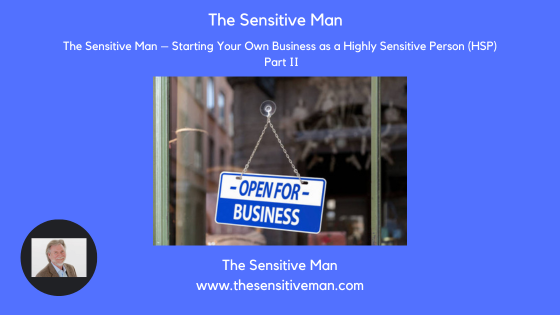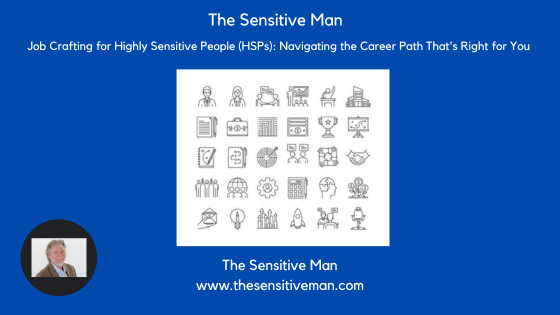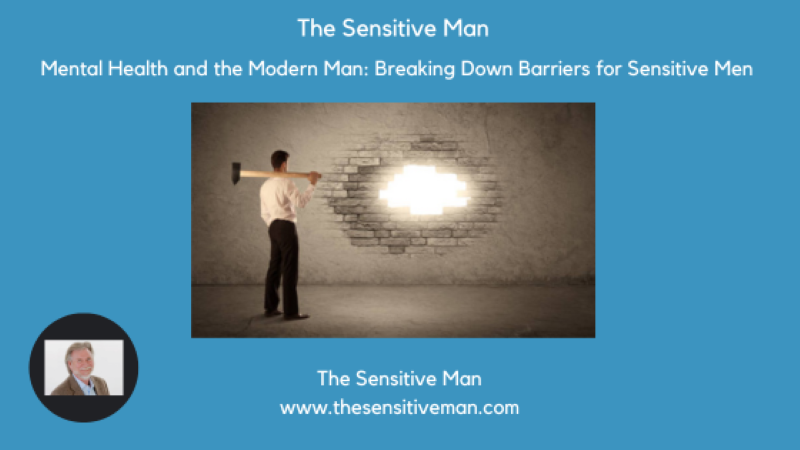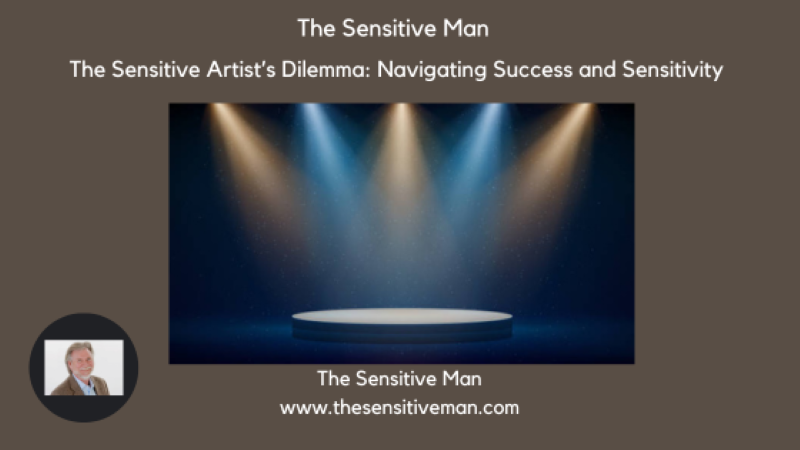|
A Blog about Sensory Processing Sensitivity from the Worldview of a High-Sensing Male
Total words 791, Time to read: 3 minutes 19 seconds Starting Your Own Business as a Highly Sensitive Person (HSP) For Highly Sensitive People (HSPs), the entrepreneurial path offers a unique opportunity to create a business environment that aligns perfectly with their sensitivity and strengths. This approach allows HSPs to control their work setting, pace, and interactions, tailoring their business to suit their deep processing needs and empathetic nature. However, starting a business requires careful planning, strategic thinking, and accessing the right resources. This blog will guide HSP entrepreneurs through finding the right business fit, conducting market research, writing a business plan, and leveraging available resources and support. Finding the Right Business Fit Brainstorming Business Ideas: For HSPs, the best business ideas often stem from personal passions or problems they wish to solve, which resonate deeply with their values and sensitivity. Begin by listing activities or areas where you naturally excel and feel deeply involved, such as creating art, counseling, or environmental conservation. Consider how these passions could translate into a viable business that satisfies a market need and aligns with your temperament and lifestyle needs. Next, evaluate how these ideas fit with your sensitivity. For example, if you are particularly affected by the emotions of others, a business that minimizes direct conflict, such as a behind-the-scenes art restoration service, might suit you better than a high-stress sales environment. Exploring Established Paths: Franchising or purchasing an existing business can be excellent options for HSPs. These paths provide a structured business model and an established brand, which can reduce the stress and uncertainty of starting from scratch. Investigate franchises or businesses for sale that match your identified interests and evaluate how their required day-to-day operations align with your sensitivity. Market Research and Business Planning Conducting Market Research: Understanding the market is crucial to ensuring the viability of your business idea. Start by identifying your target customers and learning as much as you can about their needs, preferences, and buying behaviors. Use online surveys, focus groups, or one-on-one interviews to gather data. This step is vital for HSPs, as it helps confirm demand for your product or service, which can alleviate anxiety over the business's potential success. Look at competitors in your chosen niche. What are they offering, and how can you differentiate your business? As an HSP, your unique perspective on customer care, product design, or service delivery can be a significant differentiator. This would be a good time to understand the SWOT (Strengths, Weaknesses, Opportunities, and Threats) analysis methodology to compare your proposed businesses with other established companies. Writing a Business Plan: Your business plan should be a comprehensive document that outlines your business idea, market research findings, operational structure, and financial projections. For HSPs, it's essential to balance realism with your unique perspective. Incorporate your strengths, such as attention to detail and empathy, as key elements in your business strategy, especially in customer service and team management. Do an online search for Business Plan templates to aid you in developing your plan. A solid business plan will also address potential stress points and outline strategies for managing them, ensuring they are aligned with your need for a supportive work environment. Resources and Support Accessing Business Resources: Numerous resources are available to help aspiring HSP entrepreneurs. Organizations like SCORE (in the U.S.) offer free mentoring from experienced business professionals and can provide guidance tailored to the sensitive nature of HSPs. SCORE mentors can assist in refining your business idea, developing your business plan, and navigating the early stages of business setup. Government aids, such as the Small Business Administration (SBA), provide tools for business planning, financial assistance programs, and guides on legal requirements for starting a business in your area. Utilizing these resources can reduce the feeling of overwhelm and provide clear steps to follow. Also, check regional, state, and local governments for help in your area. Websites and Online Resources: Several online platforms can be invaluable in the early stages of business formation. Websites like Entrepreneur.com and Inc.com offer articles, tips, and insights into starting and running a business. For HSP-specific advice, look for forums and websites catering to sensitive entrepreneurs, offering community support, and understanding the unique challenges HSPs face in the business world. Conclusion Starting a business as an HSP can be a fulfilling path to professional independence and personal satisfaction. By leveraging your innate strengths, conducting thorough market research, and accessing the right resources and support, you can create a business that succeeds in the market and supports your well-being as a highly sensitive person. Remember, the key to a successful business venture for an HSP lies in aligning your business practices with your sensitivity, ensuring that your professional environment enhances your personal and business potential. In Part III, we talk about launching and growing your business.
0 Comments
A Blog about Sensory Processing Sensitivity from the Worldview of a High-Sensing Male
Total words 655, Time to read: 2 minutes 45 seconds If you identify as a Highly Sensitive Person (HSP), you are likely well aware of how your unique sensory sensitivity can influence your interactions and experiences in the workplace. Understanding and embracing your sensitivity can lead to surviving and thriving in your career by following a process known as job crafting. This personalized approach allows you to explore and find work environments that respect and harness your natural traits like empathy, intuition, and keen attention to detail. In this blog post, we'll guide you through understanding yourself as an HSP, identifying careers that might be a good fit, and navigating the job search process. Understanding Yourself as an HSP Introduction to Job Crafting: Job crafting is a technique that allows individuals to reshape their jobs to fit their skills and passions better, as well as, in the case of HSPs, their sensitivity. This could mean adjusting your tasks, rethinking your interactions, or changing your work environment to better suit your emotional and sensory needs. Personality Tests and Exercises: To start, HSPs should engage in self-reflection exercises and consider taking personality assessments like the Myers-Briggs Type Indicator (MBTI) or the Highly Sensitive Person Scale. These tools can provide deeper insights into how you perceive the world and process stimuli, which is crucial for understanding what kinds of work environments will suit you best. Value Systems Exercises: It's also important to clarify your values and what you need to feel fulfilled at work. Exercises like listing your top five values or visualizing your ideal workday can help articulate what truly matters to you. This clarity will guide you in seeking environments that resonate with your personal and professional goals. Identifying Suitable Careers Sensitive individuals often excel in roles that make use of their inherent abilities. For example, careers in the arts, counseling, academia, and healthcare can be highly rewarding for HSPs. These fields often require a depth of thought, sensitivity to others' needs, and a detailed-oriented approach—traits that HSPs naturally possess. However, it's not just about the field you choose; it's about finding a role that aligns with your sensitivity. For instance, within healthcare, an HSP might thrive more in roles that require one-on-one interactions rather than high-stress emergencies. The Job Search Process Navigating the job market as an HSP requires a strategy that acknowledges your sensitivity as a strength. Here are some tips: Unconventional Job Searching: Beyond the usual job boards, HSPs should consider tapping into professional networks through platforms like LinkedIn or joining specific forums and groups that cater to sensitive individuals or the industries in which they are interested. Sometimes, the best opportunities come from connections made in unexpected places. Resume Writing: Your resume should highlight your HSP traits as strengths. For example, emphasize your exceptional empathy, ability to manage and resolve conflicts, or detail-oriented project management skills. Each of these can be highly desirable in many professions. Selling Your Traits in the Job Market: In interviews, be prepared to discuss examples of how your sensitivity has been an asset in your work. You might talk about a time when your attention to detail caught a potentially costly mistake or how your empathy helped resolve a client's issue effectively. Resources for HSPs: Several resources can aid your job search. Websites like The Highly Sensitive Person (hsperson.com) and Psychology Today often post articles and job opportunities suited for HSPs. Additionally, consider consulting with a career counselor specializing in helping sensitive individuals. Here's an additional link from friend and HSP Coach, Lauren Hunter: https://hspjourney.com/25-good-jobs-for-the-highly-sensitive-person/ Conclusion Crafting a job that fits your high sensitivity is not just about finding the right type of work; it's about ensuring your work environment values and supports your innate traits. By understanding yourself, identifying suitable careers, and applying targeted job search strategies, you can find a job that fits and craft a career that fulfills you. Remember, as an HSP, you bring unique and valuable perspectives to the table, and the right job is one that will celebrate, not just accommodate your sensitivity. The Sensitive Man – Mental Health and the Modern Man: Breaking Down Barriers for Sensitive Men4/10/2024 A Blog about Sensory Processing Sensitivity from the Worldview of a High-Sensing Male
Total words 823, Time to read: 3 minutes 27 seconds In today's fast-paced world, the dialogue around mental health is louder and more open than ever. Yet, despite these advancements, a significant portion of the population remains cloistered in silence, burdened by outdated norms and expectations. Men, in particular, find themselves at the crossroads of evolving societal views on masculinity and the perennial stigma of mental health issues. This is especially true for sensitive men, who navigate a delicate balance between societal expectations of stoicism and their innate depth of feeling and emotional acuity. The Stigma Around Men's Mental Health Traditional views of masculinity have long discouraged emotional openness among men, painting vulnerability as a weakness rather than a strength. This cultural backdrop contributes to a reality where mental health issues are often minimized or ignored, with many men feeling compelled to suffer in silence. The statistics are telling; research shows that men are less likely to seek help for mental health concerns, a trend that is exacerbated among those with heightened sensitivity, who might fear their openness could lead to further misunderstanding or judgment. Challenges for Sensitive Men Sensitive men face a unique set of challenges in this context. Though incredible assets, their depth of feeling and empathy can also make them feel profoundly misunderstood. The societal pressure to conform to traditional masculine roles often means that their sensitivity is seen as an anomaly rather than a trait to be celebrated. This discrepancy can lead to internal conflicts, self-doubt, and a hesitancy to express vulnerability for fear of not fitting the mold. Such challenges not only exacerbate existing mental health issues but also create barriers to seeking support. Barriers to Accessing Mental Health Resources Accessing mental health resources is a daunting task for many, but for men, the journey is often compounded by a lack of awareness and tailored services. The fear of judgment — of not being "man enough" — looms large, casting a shadow over the path to seeking help. Personal stories from men who have navigated these waters often highlight these barriers, underscoring the need for a more inclusive approach to mental health support that acknowledges and respects the full spectrum of masculinity. Strategies for Breaking Down Barriers Overcoming these barriers requires a multifaceted approach. Online forums and support groups can provide anonymous spaces for men to express their feelings and share experiences, fostering a sense of community and understanding (see the HSP Men's Online Discussion Group). Professional counseling can offer personalized support, particularly services that cater to men's specific needs. Additionally, initiatives within workplaces, schools, and community centers can help make mental health resources more accessible and reduce the stigma associated with seeking help. We as a society need to champion the idea that mental health is an important part of overall health, making mental health financially accessible, highly available at all levels of mental health needs, and destigmatizing mental health, especially for men. Creating Supportive Environments Encouraging openness and vulnerability starts with creating supportive environments at home, at work, and within broader communities. Family, friends, and colleagues are pivotal in this regard. By offering understanding and support, they can help dismantle the societal barriers that discourage men from expressing vulnerability and seeking help. The Role of Society in Changing Perceptions The good news is that societal perceptions of masculinity and mental health are evolving. Movements and campaigns aimed at destigmatizing mental health issues in men are gaining traction, with public figures and celebrities leading the charge by sharing their own struggles and triumphs. These efforts are slowly but surely making a difference, offering hope and inspiration to men who might otherwise feel isolated in their experiences. Conclusion The journey towards breaking down the barriers to men's mental health, particularly for sensitive men, is ongoing. While challenges remain, the increasing openness and evolving societal perceptions offer a beacon of hope. It's a reminder that sensitivity and emotional depth are strengths, not weaknesses and that seeking help is a sign of courage, not vulnerability. As we continue navigating this landscape, let's contribute to a more understanding and supportive society. Whether by offering a listening ear, advocating for more inclusive policies, or simply being more open about our own experiences, we can all play a part in breaking down these barriers. Remember, it's okay not to be okay, and seeking help is vital to healing. Additional Resources For those looking to explore this topic further or seeking support, here are some resources tailored for men: Movember: https://us.movember.com/ Offers support for men's mental health and suicide prevention. Men's Health Forum: https://www.menshealthforum.org.uk/ Provides advice and forums for men to discuss health issues. Heads Up Guys: https://headsupguys.org/ A resource for men battling depression, offering strategies and support. Men's Groups: https://mensgroup.com/ Men meeting with men about relevant and timely topics; HSP Men's Online Group – for and about HSP Men https://www.thesensitiveman.com/hsp-mens-group.html Together, we can redefine strength not as the absence of vulnerability but as the courage to face it head-on. A Blog about Sensory Processing Sensitivity from the Worldview of a High-Sensing Male
Total words 1099, Time to read: 6 minutes 0 seconds Highly Sensitive Persons (HSPs) hold a special place in the realm of creativity. Their innate ability for deep processing, keen observation, emotional acuity, and sensitivity to subtleties allows them to produce art that resonates deeply with others. Many renowned artists, including Robin Williams, Steve Martin, Elton John, John Lennon, Neil Young, and others, have been considered highly sensitive, contributing immensely to the richness of art and culture. Recently, I viewed a documentary on the life and times of Steve Martin, the American comedian. I have always enjoyed his absurdist, "wild and crazy guy" comedy. I watched his act in the early days after he began touring college campuses in the 70s. He appeared so cool and in control of things. In fact, after his appearance at the campus student center, he led a bunch of us students out onto the back of the Golden Spur, where an empty fountain area became a human swimming pool. We passed him around over our heads like a frenzied mosh pit, and I was amazed at his ability to control a drunk and stoned college crowd like the pied piper. I left shortly after that, but the antics continued. He led the diminishing crowd off the campus into a McDonalds, with one hundred students in tow, and ordered one French fry. Not a bag, but one French fry to the crowd's delight and the poor clerk's consternation, who had to explain they didn't serve singular fries. These antics later appeared in an article in Rolling Stone magazine featuring an interview with Martin. The documentary highlighted some of these acts of comedy. Still, it wasn't until later in the documentary, when it was revealed more about Martin's shyness, introversion, and sensitivity, that I realized the heavy toll it took on his personality to be the star he had always craved. Many highly sensitive people are ironically drawn to become celebrities, largely fueled by desires for acceptance and driven by our unique creativity. The price to be paid is often heavy, including seclusion, depression, drug and alcohol abuse, and sometimes unfortunately, an early death. This blog is dedicated to those brave souls who ventured beyond their comfort zones and dove headfirst into the pool of superstardom. Some survived, others didn't. The Creative Edge of Sensitivity Sensitivity in artists is not just a personality trait; it's a tool that enriches their creative process. It enables HSPs to see the world differently, feel emotions more intensely, and translate these experiences into their art, making it deeply nuanced and impactful. This unique perspective allows their work to touch people on a profound level, whether through painting, writing, acting, or any other form of artistic expression. The Price of Sensitive Creativity However, this sensitivity comes at a cost. The traits that fuel their creativity can also lead to significant personal challenges, especially when mixed with the pressures of fame and success. The intense depth of feeling and empathy can lead to overwhelm, depression, internal self-doubts, and loneliness. Furthermore, the struggle to balance sensitivity with the public scrutiny that often accompanies success can drive some to use and abuse drugs and alcohol as a coping mechanism. The Impact of Fame on HSP Artists The stories of many celebrated artists illustrate how fame can exacerbate the challenges HSPs face. For instance, the intense public spotlight and the demands of their careers have led many sensitive artists to confront personal turmoil, with some struggling in their battles with substance abuse and depression. These challenges underscore the complex relationship between sensitivity, creativity, and fame, highlighting the need for support and understanding. Preventative Measures and Coping Strategies Yet, the narrative that sensitivity must inevitably lead to suffering under the weight of success is one we can change. There are several strategies that HSP artists can employ to manage their sensitivity and mitigate the pressures of fame: - Setting Boundaries: Learning to say no and protecting personal time can help manage the overwhelm. It's not always about making more, doing more, and scaling new heights. Learning to take things in measured steps allows for assimilation. - Supportive Communities: Finding or creating communities that understand and share the HSP trait can provide invaluable support. I imagine it would not be hard to find fellow HSPs in the creative community. Education and acceptance will allow the HSP celeb to navigate the sometimes treacherous waters of fame. - Self-Care: Prioritizing self-care through mindfulness, exercise, and hobbies can help maintain mental and emotional balance. - Therapeutic Options: Counseling or therapy can offer strategies to manage sensitivity and the challenges that come with it. Redefining Success for the Sensitive Artist Success for the HSP artist does not have to mean sacrificing well-being for art's sake. It's possible to redefine success to include personal fulfillment, balance, and mental health alongside artistic achievement. This redefinition encourages HSP artists to strive for a model of success that honors their sensitivity as a strength rather than a hindrance. We must prevent the familiar script of tragic artists trampled by adoring fans and pressured by greedy and corrupt handlers. Conclusion The artistic contributions of HSPs are undeniably valuable, bringing depth, nuance, and emotion to the cultural landscape. While the challenges they face are real, HSP artists can navigate their paths to success without sacrificing their well-being with the right support and strategies. It's a call to action for the art community, mental health professionals, and society to provide the understanding and support sensitive artists need to thrive. The artists nourish our souls, and it's time we protected theirs. Additional Resources For HSP artists seeking support, consider exploring the following resources: - The Highly Sensitive Person by Dr. Elaine N. Aron: A book and website offering insights into the trait of high sensitivity. https://hsperson.com - Sensitive—The Untold Story: A documentary featuring the experiences of highly sensitive people, including artists. - Mindful: Offers resources on mindfulness practices that can help manage sensitivity. https://mindful.org - The National Coalition for Creative Arts Therapies Associations (NCCATA): Provides information on arts therapies that can be particularly beneficial for HSP artists. https://www.nccata.org/ - Online Communities: Platforms like Julie Bjelland's Sensitive Empowerment, The Highly Sensitive Refuge, and Jules DeVitto's Highly Sensitive Humans offer forums for HSPs to share experiences and find support. https://www.juliebjelland.com/ https://highlysensitiverefuge.com/ https://www.highlysensitivehumans.com/ The journey of the HSP artist is filled with both challenges and rewards. Recognizing the value of sensitivity in the creative process while also addressing the personal costs of this trait is essential. With support, understanding, and practical strategies for managing sensitivity, HSP artists can succeed without sacrificing, contributing their unique voice to the art world. |
AuthorBill Allen currently lives in Bend, Oregon. He is a certified hypnotist and brain training coach at BrainPilots.com. He believes that male sensitivity is not so rare, but it can be confounding for most males living in a culture of masculine insensitivity which teaches boys and men to disconnect from their feelings and emotions. His intent is to use this blog to chronicle his personal journey and share with others. Archives
July 2024
Categories
All
|





 RSS Feed
RSS Feed
